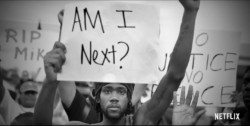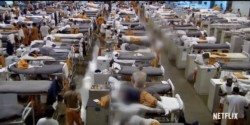13th: A black insight into America’s prison industry
13th is a powerful documentary that charts the evolution of the American justice system: a system that has seen its black citizens freed from the shackles of slavery only to be cast in the chains of criminals.
Released on Netflix in October, 13th considers the ways in which the slavery of black Americans, the subsequent system of convict leasing and the oppressive Jim Crow laws continue to be enforced today within the USA under a new guise; mass incarceration. Activists, academics and politicians consider the significant loop hole in the 13th Amendment that has enabled the denial of black freedom through en masse convictions in modern American society.
Racism is not only politically motivated but is feeding the prison industry
Through the presentation of the young, black, male figure as a “super predator” and the clamping down on small-time drug possession in poor black communities under the banner of “the war on drugs”, the documentary shows the ease with which a black American can find themselves serving jail time. Director Ava DuVernay, who also directed 2014’s Martin Luther King biopic Selma, illustrates that racism is not only politically motivated but is feeding the prison industry from which commercial outlets make financial gain and stresses that this is happening now. The “generational trauma” suffered as a result of continued prejudice towards black people continues and immeasurably complicates the vision of the United States of America as “the land of the free”.
13th is an informative, infuriating mouthpiece for unbelievably troubling accounts of racial discrimination. A must-watch for anyone on either side of the debate surrounding the current Black Lives Matter campaign, it emphasises the importance of human dignity regardless of race. The film is visually striking, comprised of a combination of talking head-style interviews, archive footage and animated illustrations that present facts, figures and names at various points throughout the film, all critically in black and white. A white wall is shown with names written on individual black pieces of tape; black victims of police brutality. A counter is also shown intermittently, tracking the ever-increasing prison population totals over four decades and lyrics appear, as though scrawled in white chalk on a blackboard, of songs written and performed by black artists addressing social injustices. In one particularly memorable animation, a series of black figures in striped prison uniforms whizz along the frame. The lines of their uniforms are blurred and so, too, are the lines of black crime.
There is a brief lull in the documentary’s momentum when focus is pulled to the corporate gain behind American prisons and wanders away from the individual cases that are placed throughout to maintain audience empathy. Almost in response to this, however, the film makes a jarring and immediate return to the subject of racial discrimination. A series of clips depicting racial violence under the Jim Crow laws are intercut with videos of modern day racial attacks to the soundtrack of a Donald Trump speech praising the “good old days” of violent justice. If this montage does not convince the film’s audience that racism is far from history, I don’t know what will.
Director: Ava Duvernay
Run Time: 100 minutes
Country: United States


Comments